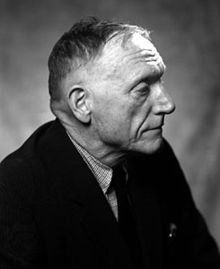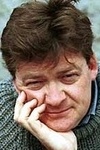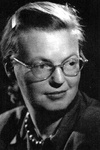Robert Penn Warren
Auteur
Activité et points forts
Thèmes principaux
Classement dans les bibliothèques
Quelques chiffres
Note moyenne : 7.2/10Nombre d'évaluations : 5
0 Citations 6 Commentaires sur ses livres
Les derniers commentaires sur ses livres

Comment passer de la fille du maître à esclave en quelques heures ? C'est ce qui arrive à l'héroïne à la mort de son père, parce que sa mère était une esclave.
Afficher en entier
notre héroïne coule des jours heureux avec son père dans la plantation familiale, sauf que le jour de sont décès elle est arrêtée et considérée comme une esclave car sa mère avait du sang noir, c'est une quarteronne. elle sera vendue a un riche planteur...
un film a été tiré de ce livre avec clark gable.
Afficher en entier
Un grand livre: une écriture remarquable, un thème intéressant (le monde politique). Un de ces magnifiques romans nord-américains qui brossent des ambiances en quelques mots et quelques phrases, qui déconcertent parfois par leur construction différente des pratiques "classiques": mais, au final, une lecture qui enrichit.
Afficher en entier
Un très bon livre. Une fresque américaine ample et profonde. Un roman à découvrir de toute urgence.
Découvrez ma lecture approfondie ici :
https://viduite.wordpress.com/2017/01/04/un-endroit-ou-aller-robert-penn-warren
Afficher en entier
Très bon retour pour ma part. Sur un thème " politique " en fil rouge, ou suit les pensées d'un personnage des années 30 dans le sud de l'Amérique. Bras droit du gouverneur Stark, Jack est cynique et ne crois qu'en la vérité. L'écriture est incroyable, si vous êtes dans un mauvais mood, vaut mieux évité, ici rien ne ressortira de positif.
On cherche à comprendre la moral des "Hommes" , jusqu'ou sont ils prêt à aller par principe ou pour leurs valeurs ?
Afficher en entierLes gens aiment aussi
Dédicaces de Robert Penn Warren
et autres évènements
Aucun évènement prévu
Editeurs
Phébus : 1 livre
Stock : 1 livre
Points : 1 livre
LGF - Le Livre de Poche : 1 livre
Les Belles Lettres : 1 livre
Monsieur Toussaint Louverture : 1 livre
Editions Seguier : 1 livre
10/18 : 1 livre















Biographie
Robert Penn Warren (April 24, 1905 – September 15, 1989) was an American poet, novelist, and literary critic and was one of the founders of New Criticism. He was also a charter member of the Fellowship of Southern Writers. He founded the influential literary journal The Southern Review with Cleanth Brooks in 1935. He received the 1947 Pulitzer Prize for the Novel for his novel All the King's Men (1946) and the Pulitzer Prize for Poetry in 1958 and 1979. He is the only person to have won Pulitzer Prizes for both fiction and poetry.
Warren was born in Guthrie, Kentucky, which is very near the Tennessee-Kentucky border, to Robert Warren and Anna Penn.[1] Warren's mother's family had roots in Virginia, having given their name to the community of Penn's Store in Patrick County, Virginia.[2] Robert Penn Warren graduated from Clarksville High School in Clarksville, Tennessee, Vanderbilt University in 1925 and the University of California, Berkeley in 1926. Warren later attended Yale University and obtained his B. Litt. as a Rhodes Scholar from New College, Oxford, in England in 1930. He also received a Guggenheim Fellowship to study in Italy during the rule of Benito Mussolini. That same year he began his teaching career at Southwestern College (now Rhodes College) in Memphis, Tennessee.
While still an undergraduate at Vanderbilt, Warren became associated with the group of poets there known as the Fugitives, and somewhat later, during the early 1930s, Warren and some of the same writers formed a group known as the Southern Agrarians. He contributed "The Briar Patch" to the Agrarian manifesto I'll Take My Stand along with 11 other Southern writers and poets (including fellow Vanderbilt poet/critics John Crowe Ransom, Allen Tate, and Donald Davidson). In "The Briar Patch" the young Warren defends racial segregation, in line with the traditionalist conservative political leanings of the Agrarian group, although Davidson deemed Warren's stances in the essay so progressive that he argued for excluding it from the collection.[3] However, Warren recanted these views in an article on the Civil Rights Movement, "Divided South Searches Its Soul", which appeared in the July 9, 1956 issue of Life magazine. A month later, Warren published an expanded version of the article as a small book titled Segregation: The Inner Conflict in the South.[4] He subsequently adopted a high profile as a supporter of racial integration. In 1965, he published Who Speaks for the Negro?, a collection of interviews with black civil rights leaders including Malcolm X and Martin Luther King, thus further distinguishing his political leanings from the more conservative philosophies associated with fellow Agrarians such as Tate, Cleanth Brooks, and particularly Davidson. Warren's interviews with civil rights leaders are at the Louie B. Nunn Center for Oral History at the University of Kentucky.[5]
Warren served as the Consultant in Poetry to the Library of Congress, Poet Laureate, 1944–1945, and went on to win the Pulitzer Prize in 1947, for his best known work, the novel All the King's Men, whose main character, Willie Stark, resembles the radical populist governor of Louisiana, Huey Pierce Long (1893–1935), whom Warren was able to observe closely while teaching at Louisiana State University in Baton Rouge from 1933-42. Warren won Pulitzer Prizes in poetry in 1958 for Promises: Poems 1954-1956, and in 1979 for Now and Then. He is the only writer ever to win the Pulitzer in both fiction and poetry.[6] All the King's Men, starring Broderick Crawford, became a highly successful film, winning the Academy Award for Best Picture in 1949. A 2006 film adaptation by writer/director Steven Zaillian featured Sean Penn as Willie Stark and Jude Law as Jack Burden. The opera Willie Stark by Carlisle Floyd to his own libretto based on the novel was premiered in 1981.
In 1974, the National Endowment for the Humanities selected Warren for the Jefferson Lecture, the U.S. federal government's highest honor for achievement in the humanities. Warren's lecture was entitled "Poetry and Democracy" (subsequently published under the title Democracy and Poetry).[7][8] In 1980, Warren was presented with the Presidential Medal of Freedom by President Jimmy Carter. In 1981, Warren was selected as a MacArthur Fellow and later was named as the first U.S. Poet Laureate Consultant in Poetry on February 26, 1986. In 1987, he was awarded the National Medal of Arts.[9]
Warren was co-author, with Cleanth Brooks, of Understanding Poetry, an influential literature textbook. It was followed by other similarly co-authored textbooks, including Understanding Fiction, which was praised by Southern Gothic and Roman Catholic writer Flannery O'Connor, and Modern Rhetoric, which adopted what can be called a New Critical perspective.
Warren was secretly married in the summer of 1929 to Emma Brescia until their divorce in 1951. His second marriage was in 1952 to Eleanor Clark, with whom he had two children, Rosanna Phelps Warren (b. 1953) and Gabriel Penn Warren (b. 1955). He lived the latter part of his life in Fairfield, Connecticut, and Stratton, Vermont where he died of complications from bone cancer. He is buried at Stratton, Vermont, and, at his request, a memorial marker is situated in the Warren family gravesite in Guthrie, Kentucky.
Afficher en entier